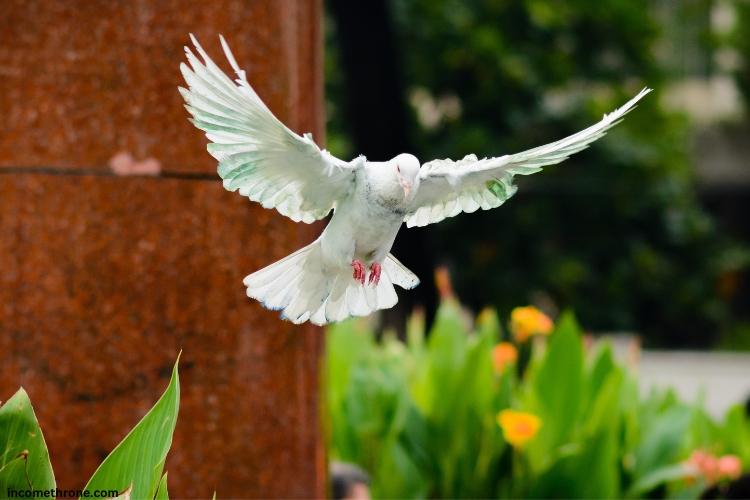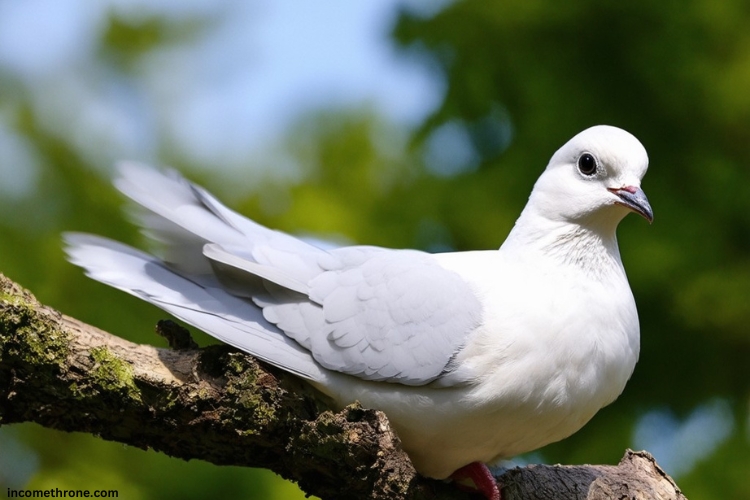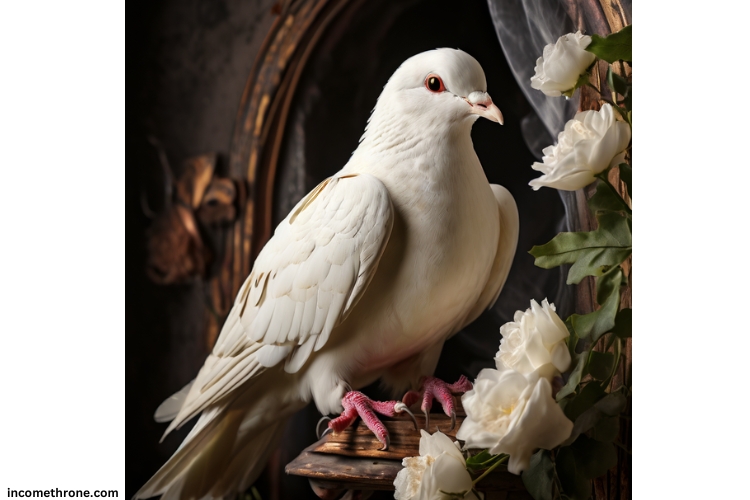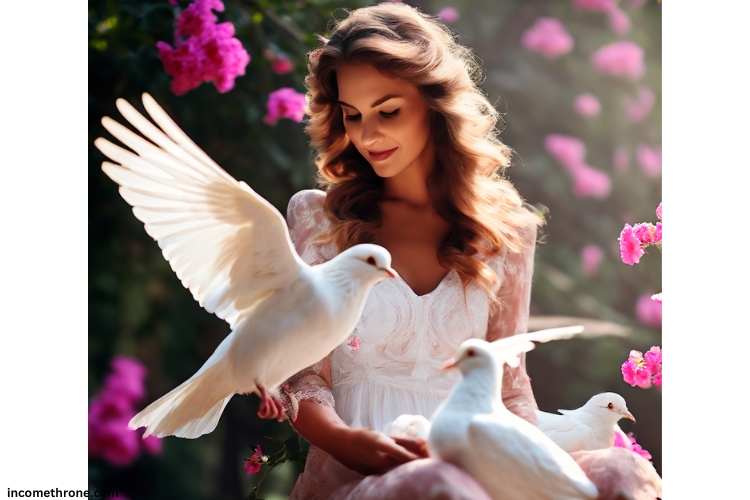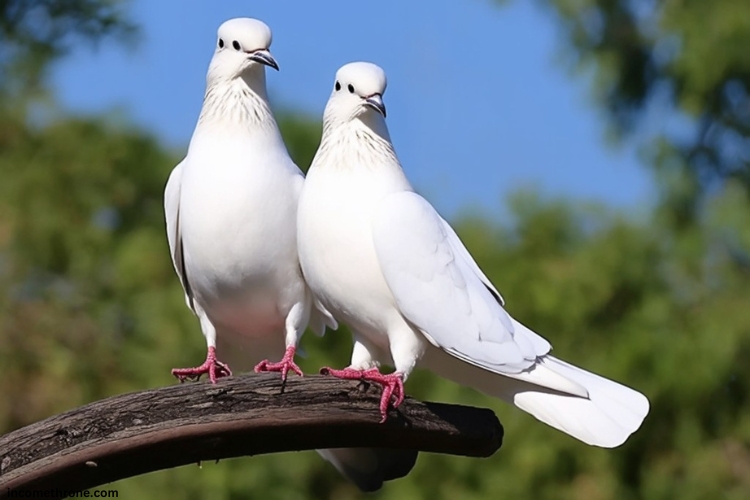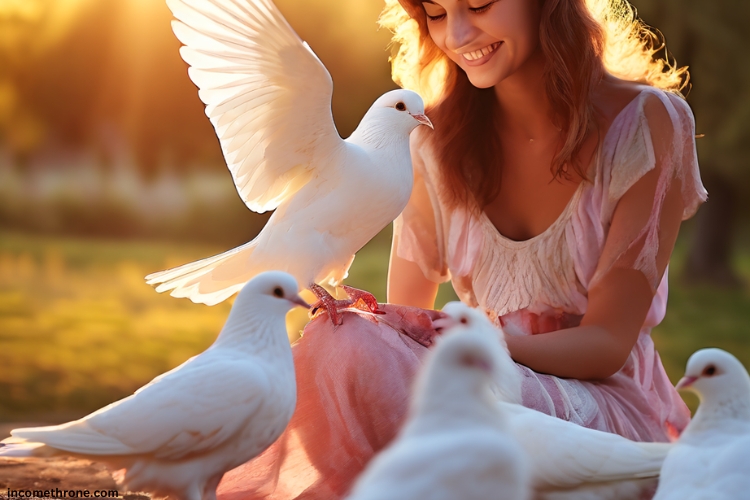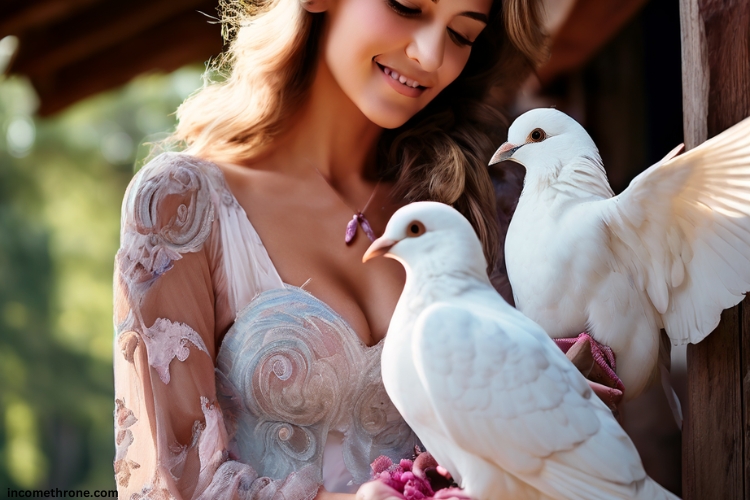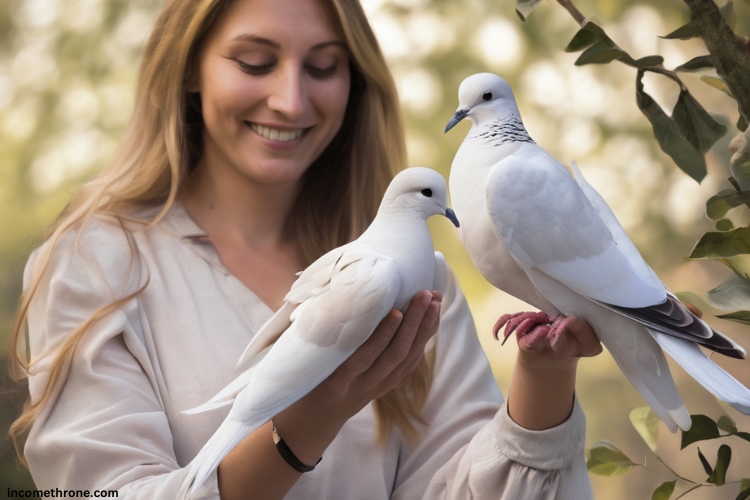The allure of doves as companions is undeniable. Their gentle cooing and serene presence make them a popular choice for bird enthusiasts and those seeking a peaceful pet.
In this blog article, we will explore about the various aspects of dove care, social needs, and the process of acquiring captive bred doves. It is essential to understand the unique requirements and behaviors of these birds to ensure a harmonious relationship between them and their human caregivers.
Whether you’re a seasoned aviculturist or a novice bird lover, this guide will provide valuable insights into where to buy captive bred doves and how to foster a nurturing environment for them.
Key Takeaways
- Doves require companionship and prefer to choose their own mates, with whom they form long-lasting bonds. Keeping multiple doves together is acceptable if ample space is provided.
- While doves are generally low-maintenance and non-aggressive, they do produce feather dust and have sensitive respiratory systems that require a clean environment free from smoke and fumes.
- Sunflowers are a traditional favorite for attracting doves, but a diverse planting can be more effective. Doves can recognize human faces and are attracted to certain colors, but this information is not yet detailed.
- Captive bred doves can be found through reputable sellers and breeders, and it’s important to evaluate these sources to ensure ethical breeding practices.
- American Mourning Doves and Homing Pigeons have specific care requirements and are not typically kept in mixed aviaries, although doves can coexist with certain other bird species if conditions are right.
Understanding Dove Companionship and Social Needs
Should I Get One or Two Doves?
When considering the addition of doves to your home, it’s important to understand their social nature. Doves are inherently social creatures and often form strong pair bonds with a chosen mate. In the event of losing a partner, it is advisable to allow the surviving dove to select a new companion to ensure compatibility. In captivity, it’s essential to replicate their natural inclination for companionship.
Companionship is not only about having another dove around; it’s about the quality of the interaction they can have. If you’re able to provide ample space and attention, keeping two doves can be beneficial for their emotional well-being. Here’s a simple list to consider when deciding on the number of doves:
- Doves prefer to choose their own mates and stay with them for life.
- A single dove requires significant human interaction or the company of another dove.
- Multiple doves can be kept together if there is sufficient space.
- Ensure each dove has enough room to fly and engage in natural behaviors.
Ultimately, whether you choose to keep one or two doves, their need for social interaction and a suitable environment should be at the forefront of your decision-making process.
Do Doves Need Friends?
Doves are inherently social creatures, often seeking companionship to fulfill their emotional needs. Doves need a companion for large portions of the day. This can be their owner, another dove, or even other docile pets. While they may not require a plethora of toys, they do enjoy simple pleasures like swings and bells.
When considering the social structure of doves, it’s important to note that they tend to form strong pair bonds. If you’re planning to keep doves, providing them with the opportunity to choose their own mate can lead to a harmonious environment. In captivity, doves can thrive in pairs or small flocks as long as they have ample space.
Here are some key points to remember about dove companionship:
- Doves can bond with humans, other doves, or peaceful pets.
- They appreciate simple toys and activities.
- Allowing doves to select their own mates can enhance their well-being.
- Adequate space is crucial for maintaining a healthy social dynamic among doves.
Do Doves Get Along with Other Birds?
Doves are known for their peaceful demeanor, but when it comes to sharing space with other birds, things can get complicated. Collared doves, for instance, are surprisingly territorial and may aggressively defend their feeding areas against smaller birds. This behavior is not just a one-off; they can be persistent in their efforts to dominate their chosen territory.
In mixed aviaries, doves are often seen cohabiting peacefully with other bird species such as finches and parakeets. Their placid nature and size generally allow them to thrive without causing issues for their aviary companions. However, it’s important to note that not all bird species make suitable roommates for doves. Parrots, known for their lively and sometimes boisterous personalities, are usually not the best match. Yet, some parrot species like Conures and Budgies have been known to coexist with doves successfully.
When considering adding a dove to a mixed-species environment, it’s crucial to understand the compatibility between the birds. Here’s a list of birds that can typically be kept with doves in an aviary setting:
- Quail
- Finches
- Parakeets
- Budgies (in some cases)
- Conures (in some cases)
Remember, while doves may get along with these birds, each bird’s temperament and the dynamics of the existing group should always be taken into account before introducing a new member.
The Practicalities of Dove Keeping
What Are the Cons of Owning a Dove?
While doves are known for their gentle nature and minimal care requirements, there are some downsides to consider before bringing one into your home.
Noise and mess can be significant factors; doves coo, which can be soothing to some but potentially irritating to others, especially in close living quarters. They also produce feather dust and droppings, necessitating regular cleaning.
Doves have sensitive respiratory systems, making them vulnerable to common household dangers such as smoke, fumes from nonstick cookware, and scented products like candles and air fresheners. It’s crucial to maintain a safe environment to prevent accidental harm.
Here’s a list of cons to consider:
- Regular cleaning required to manage feather dust and droppings
- Sensitive to common household fumes and scents
- Potential noise from cooing
- Risk of injury if not supervised, as they can get underfoot
Understanding these challenges is essential for a harmonious living situation with your feathered friend.
How Do You Know if a Dove is Happy?
Recognizing the contentment of a dove can be quite straightforward. Birds often express joy through vocalizations; if your dove is frequently talking, singing, or whistling, it’s a good sign of happiness. Additionally, a dove clicking its tongue may be seeking affection and indicating it’s comfortable with being petted.
Observing your dove’s behavior can also offer clues. A dove hanging upside down is typically a display of comfort and satisfaction in its environment. This behavior, along with a relaxed demeanor and a willingness to engage with humans or other birds, suggests a happy bird.
To ensure your dove’s happiness, consider the following points:
- Provide a safe and comfortable habitat.
- Engage in regular, gentle interaction.
- Offer toys and activities for mental stimulation.
- Maintain a consistent routine for feeding and care.
By attending to these aspects of dove care, you can create a nurturing environment that promotes the well-being of your feathered friend.
Dangers to Avoid in Dove Care
When caring for doves, it’s crucial to be aware of the environmental hazards that can affect their health. Birds have sensitive respiratory systems, and exposure to smoke, fumes from nonstick cookware, and scented products like candles and air fresheners can be harmful. It’s essential to maintain a safe and clean environment free from these dangers.
Doves are curious by nature and often explore on the ground, which puts them at risk of ingesting small objects. Always ensure that their habitat is free of potential choking hazards. Additionally, because doves can get underfoot, it’s important to be vigilant to prevent accidental injury when they are allowed out of their cage for exercise.
Predation is another concern for dove owners. Common predators include cats, dogs, and wild animals such as raccoons and foxes. Even birds of prey pose a threat. To protect your doves, provide a secure enclosure and supervise their outdoor time.
Feather dust is a byproduct of keeping doves indoors, which can affect air quality. Consider using a HEPA air cleaner to maintain a healthy environment for both you and your birds.
Attracting and Bonding with Doves
What Attracts Doves the Best?
To attract doves effectively, a diverse environment is key. While sunflowers are traditionally favored, incorporating a variety of plants can enhance your success. Doves are particularly drawn to areas that mimic their natural habitat, offering both food and safety.
When creating a dove-friendly space, consider the following points:
- Plant seeds that doves prefer, such as millet, sunflower, and corn.
- Maintain a source of clean water for drinking and bathing.
- Provide a mix of ground cover and open spaces to cater to their foraging and safety needs.
Doves also have a preference for certain colors in their environment. Duller shades like gray, brown, and dull green help these birds feel secure due to their camouflage effect. It’s important to avoid bright colors, particularly white, which can signal alarm and danger to doves.
Remember, creating a habitat that is attractive to doves not only benefits the birds but can also provide you with the joy of observing these peaceful creatures up close.
Do Doves Remember Human Faces?
Doves are known for their gentle nature and the ease with which they form bonds with humans. They are masters of the leisure arts, such as napping and sunbathing, which makes them delightful companions. Their ability to recognize and remember human faces adds to the personal connection one can have with these birds.
Recent studies suggest that doves, much like other birds, have the capacity to recognize individual humans. This recognition is not just limited to the visual aspect but may also extend to familiarizing themselves with human voices. The implications of this are significant for dove owners, as it means that consistent interaction can lead to a stronger bond between you and your feathered friend.
To foster a strong relationship with a dove, consider the following points:
- Spend time daily with your dove to reinforce recognition.
- Speak softly and consistently to help your dove learn your voice.
- Observe your dove’s behavior for signs of recognition and happiness.
Understanding the social intelligence of doves is crucial for anyone looking to form a lasting bond with these birds. By recognizing the importance of face and voice recognition, dove owners can create a nurturing environment that caters to the emotional well-being of their pets.
What Color Attracts Doves?
When creating an environment to attract doves, color plays a significant role. Duller colors such as gray, brown, and dull green are preferred by doves as they provide a sense of security through camouflage. These colors mimic their natural habitat, allowing them to feel safe from predators.
Conversely, bright colors, particularly white, are often associated with danger by many bird species. White can signal alarm, prompting doves to steer clear of the area. To maintain a dove-friendly space, it’s advisable to avoid using white and opt for more subdued tones.
Here’s a quick reference for colors that attract doves:
- Gray: Blends with urban and natural landscapes.
- Brown: Resembles the earth and tree trunks.
- Dull green: Imitates foliage and grassy areas.
Remember, the goal is to create a natural and tranquil setting that invites doves to visit and stay.
Captive Bred Dove Acquisition
Where to Find Captive Bred Doves for Sale
Finding a reputable source for captive bred doves is crucial for ensuring the health and well-being of your new feathered friend. Captive breeding is essential for the conservation of species and helps prevent the depletion of wild populations. When searching for captive bred doves, consider the following options:
- Bird fairs and expos: These events often feature a variety of breeders and vendors offering birds for sale.
- Specialized avian pet stores: Some pet stores focus specifically on birds and may have captive bred doves available.
- Online bird forums and social media groups: These platforms can connect you with breeders and other dove enthusiasts who may have birds for sale or adoption.
- Avian rescue organizations: While primarily focused on rescue, some organizations may have captive bred doves in need of homes.
It’s important to do your due diligence when selecting a seller. Look for reviews, ask for references, and if possible, visit the location to see the conditions in which the doves are kept. A responsible breeder will prioritize the health and social needs of their birds, and be transparent about their breeding practices.
Understanding the Importance of Captive Breeding
Captive breeding plays a crucial role in the conservation of bird species, particularly for those that are threatened or extinct in the wild. The hatching of a Socorro dove, extinct in the wild, is a testament to the success of such programs. By supporting captive breeding, potential dove owners can contribute to these conservation efforts.
When considering where to purchase a captive bred dove, it’s important to evaluate the breeder’s commitment to the species’ welfare. Ethical breeders will ensure that all birds are produced through natural breeding and rearing processes. They will also require proof of suitable living conditions for the birds, reflecting their dedication to the well-being of each dove.
Here are some key points to consider when evaluating dove sellers and breeders:
- Their breeding practices and whether they align with conservation goals.
- The health and genetic diversity of their birds.
- Transparency regarding the origin and breeding history of their doves.
- Willingness to provide ongoing support and advice for dove care.
Evaluating Dove Sellers and Breeders
When looking to acquire a captive bred dove, it’s crucial to evaluate sellers and breeders carefully. Ensure that the breeder is reputable and adheres to ethical breeding practices. A responsible breeder will prioritize the health and well-being of their birds over profit.
Ask for references and look for reviews from previous customers. It’s also important to visit the breeding facility if possible. Observe the conditions in which the doves are kept; they should be clean, spacious, and well-maintained. The birds themselves should appear healthy, active, and free from signs of distress or illness.
Here are some key points to consider when evaluating dove sellers and breeders:
- Reputation: Check for any certifications or memberships with avian societies.
- Health: Inquire about health guarantees and veterinary care.
- Knowledge: A good breeder will be knowledgeable about dove care and willing to answer your questions.
- Aftercare: Look for breeders who offer support after you take your dove home.
Remember, a well-chosen breeder will not only provide you with a healthy bird but also serve as an ongoing resource for your dove-keeping journey.
Species-Specific Considerations
Let’s Talk About American Mourning Doves
American Mourning Doves are known for their gentle nature and the soft, woeful coos that can bring a sense of tranquility to any environment. They symbolize peace and can serve as a comforting reminder of loved ones. These birds are not only a symbol of hope and renewal in various cultural contexts but are also considered easy to care for as pets.
When considering American Mourning Doves as pets, it’s important to be aware of their environmental needs. They have sensitive respiratory systems, so it’s crucial to keep them away from smoke, fumes from nonstick cookware, candles, and air fresheners. Additionally, they require a safe space to explore on the ground without the risk of ingesting small objects or getting underfoot.
Here are some key considerations for keeping American Mourning Doves:
- Ensure a smoke and fume-free environment.
- Provide a safe ground area for exploration.
- Consider using a HEPA air cleaner to manage feather dust indoors.
In biblical texts, the Mourning Dove is often associated with messages of hope and divine promises. Their presence around homes has been interpreted as a sign of encouragement or a visit from a friend or family member who has passed away, offering comfort to those who observe them.
Beautiful Racing / Homing Pigeons for Sale
Racing and homing pigeons, known for their remarkable navigation abilities, have been selectively bred for both speed and homing instinct. These birds are not only a hobby but also a competitive sport, with enthusiasts looking for top-quality birds to enhance their lofts.
When considering the purchase of racing or homing pigeons, it’s important to look for reputable sellers who can provide details about the birds’ lineage and health. Bloodlines such as Ameels, Hooymans, and Jan Arden are well-regarded in the racing community. Here’s a brief overview of the current market offerings:
- Location: Roodepoort, Johannesburg; Cape Town, Western Cape; Pretoria, Gauteng
- Price Range: R 100 – R 350 per pigeon
- Contact: Available through various listings on platforms like gumtree.co.za
Evaluating the seller’s reputation and the health of the pigeons is crucial. Always ask for health records and proof of pedigree to ensure you’re getting a bird that will meet your expectations for racing or companionship.
What Birds Can Be Kept with Doves?
When considering the addition of doves to an aviary, it’s important to select compatible species to ensure a harmonious environment. Doves are known for their peaceful demeanor, making them suitable companions for other non-aggressive birds. A common choice for cohabitation are finches, which share a similar need for tranquility.
In some cases, doves can also be kept with certain parrots, such as Conures and Budgies. These birds can coexist with doves in an aviary setting, provided that the overall atmosphere remains calm and quiet. However, it’s crucial to monitor interactions, as the more active nature of parrots may sometimes stress the doves.
Here is a list of birds that are typically compatible with doves in a shared aviary:
- Finches
- Conures
- Budgies
It’s essential to remember that doves thrive in pairs and require enough space to live comfortably. Whether you’re introducing a new species or adding more doves, always observe their behavior to ensure they are settling in well together.
Conclusion
In conclusion, whether you’re a seasoned bird enthusiast or a newcomer to avian companionship, the decision to purchase captive bred doves comes with a host of considerations.
From understanding their social needs for companionship and space, to ensuring their health and happiness through proper care and environment, doves make for a unique and rewarding pet experience. They are intelligent, affectionate, and can coexist peacefully with humans and other birds when introduced properly.
As you seek out the perfect doves to bring into your home, remember to support ethical breeders or rescue organizations, and prepare to provide a loving, safe, and stimulating environment for your feathered friends. With the right approach, doves can offer a serene presence and a touch of nature’s beauty to your daily life.
FAQs:
Should I get one or two doves?
Doves prefer to pick their own mate and stay with them for life. It’s fine to keep several doves together as long as there is enough space, especially since they often flock in the wild.
Are doves a good bird to have around?
Doves are easy to care for, non-aggressive, and enjoy human interaction. They require some maintenance like any pet and generate feather dust, so a HEPA air cleaner is recommended for indoor keeping.
What attracts doves the best?
Sunflowers are traditionally used to attract doves, but a diverse planting can be more effective. Providing a variety of feed can attract more doves and benefit other wildlife.
Are doves intelligent birds?
Yes, contrary to some opinions, pigeons and doves are quite intelligent.
Do doves get along with other birds?
Doves can be territorial and may drive smaller birds away from feeding areas. However, they can coexist with other docile pets and bird species when introduced properly.
What birds can be kept with doves?
While doves are not usually kept in mixed aviaries, they can be mixed with finches and parakeets in large enough aviaries without causing problems due to their placid nature

